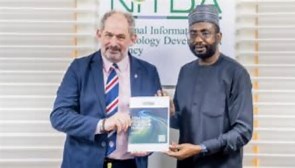NITDA Teams Up with UK’s Lancaster University to Accelerate Nigeria’s Digital Revolution
NITDA Teams Up with UK’s Lancaster University to Accelerate Nigeria’s Digital Revolution
By Achimi Muktar
In a bold move to tackle food insecurity, climate change, and chronic power shortages, the Federal Government has launched a game-changing $500 million project backed by the World Bank—one that promises to revolutionize agriculture and energy in Nigeria.
By
The project, called the Sustainable Power and Irrigation for Nigeria (SPIN) initiative, officially kicked off with the inauguration of its high-powered Steering Committee on Friday in Abuja. The committee, co-chaired by the Minister of Water Resources and Sanitation, Prof. Joseph Utsev, and the Minister of Power, is expected to drive the ambitious project that could redefine Nigeria’s food and energy landscape.
A Bold Vision for a Hungry, Thirsty Nation
Addressing stakeholders at the launch, Prof. Utsev declared that SPIN is more than just a project—it is a cornerstone of President Bola Tinubu’s Renewed Hope Agenda. The initiative aims to develop vast multi-purpose infrastructure for irrigation and hydropower, targeting:
500,000 hectares of irrigated agriculture
30 gigawatts of clean, sustainable energy
Stronger resilience to floods, droughts, and climate change
"SPIN builds on the success of the TRIMING project, which rehabilitated 32,000 hectares of farmland," Utsev noted. "But now we’re going bigger, bolder, and smarter."
Two Models, One Goal: Food and Energy for All
The SPIN project will operate under two models:
Model 1: Federal government-led schemes in collaboration with states.
Model 2: Support for state-owned irrigation systems.
Already, 34 states have shown interest, with 27 pledging commitment and 17 meeting rigorous criteria, including enacting laws to support Water Users Associations (WUAs), budgeting for maintenance, and providing counterpart funding.
From Policy to Productivity: Agriculture Sector Demands Results
Minister of Agriculture and Food Security, Senator Abubakar Kyari, welcomed the initiative as a potential turning point but called for clear, measurable outcomes.
“What will this project deliver in terms of food output? Employment? Economic growth?” Kyari asked. “With the right focus, our population is not a burden—it’s our greatest asset.”
He urged that Nigeria must use the project to transform its vast rural potential into productive, modern agricultural zones.
Hydropower to the Rescue: Lighting the Way to a Greener Future
Representing the Minister of Power, Mr. Mahmadu Mamman emphasized hydropower as Nigeria’s ticket to a sustainable energy future. With its efficiency, grid-stabilizing capability, and synergy with solar and wind, hydropower, he said, could unlock private sector investment and drive the clean energy transition.
“Energy is not just a commodity—it’s the bedrock of development,” Mamman stated, adding that the Ministry of Power would actively seek investors to scale hydropower solutions across the country.
Steering Nigeria Toward a Resilient Tomorrow
The SPIN Steering Committee is made up of federal ministers and state commissioners from participating states and will serve as the apex policy and decision-making body for the project. The interim team has already completed critical groundwork, including field assessments, a detailed Project Appraisal, and an 18-month work plan.
From transforming agriculture to stabilizing the power grid, the SPIN project is poised to rewrite Nigeria’s development narrative—one megawatt and one harvest at a time.
If fully realized, this $500 million investment could do more than irrigate farms—it could irrigate hope.

















